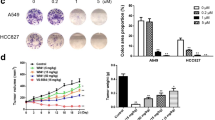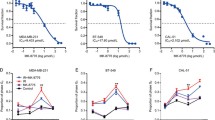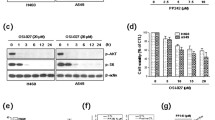Abstract
Chemotherapy- or radiotherapy-induced DNA damage activates the Chk1-dependent DNA damage response (DDR) and cell cycle checkpoints to facilitate cell survival. Numerous attempts have been made to identify specific Chk1 inhibitors to enhance the efficiency of chemotherapy or radiotherapy. In this study, we investigated the molecular mechanisms underlying the antitumor activity of LY2603618, a potent and selective small molecule inhibitor of Chk1 protein kinase, in human lung cancer cells. Treatment of cancer cells with LY2603618 caused cell cycle arrest in the G2/M phase. A marked induction of DDR, including the phosphorylation of ATM, Chk2, p53 and histone H2AX, was observed after LY2603618 treatment. LY2603618 inhibited Chk1 autophosphorylation (S296 Chk1) and increased DNA damage-mediated Chk1 phosphorylation (S345 Chk1). In addition, LY2603618-treated lung cancer cells transitioned from LC3-I to LC3-II, a hallmark of autophagy. Blocking autophagy with chloroquine (CQ) further enhanced LY2603618′s inhibitory effect on cell viability/proliferation. LY2603618 also significantly increased p38 and c-Jun N-terminal kinase (JNK) phosphorylation. Pretreatment with the JNK inhibitor reduced cleavage of caspase-3 and PARP levels in LY2603618-treated cells. These results suggest the following: (i) the biological consequences of LY2603618 in lung cancer cells is associated with both inhibition of Chk1 phosphorylation on S296 and activation of the DNA damage response network; and (ii) the anticancer property of LY2603618 might be increased by inhibiting autophagy.






Similar content being viewed by others
References
Yi C, He C (2013) DNA repair by reversal of DNA damage. Cold Spring Harb Perspect Biol 5:a012575
Lagerwerf S, Vrouwe MG, Overmeer RM, Fousteri MI, Mullenders LH (2011) DNA damage response and transcription. DNA Repair (Amst) 10:743–750
Jun DW, Jeong YS, Kim HJ, Jeong KC, Kim S, Lee CH (2012) Characterization of DDRI-18 (3,3′-(1H,3′H-5,5′-bibenzo[d]imidazole-2,2′-diyl)dianiline), a novel small molecule inhibitor modulating the DNA damage response. Br J Pharmacol 167:141–150
Tao Y, Leteur C, Yang C et al (2009) Radiosensitization by Chir-124, a selective CHK1 inhibitor: effects of p53 and cell cycle checkpoints. Cell Cycle 8:1196–1205
Sperka T, Wang J, Rudolph KL (2012) DNA damage checkpoints in stem cells, ageing and cancer. Nat Rev Mol Cell Biol 13:579–590
Smith J, Tho LM, Xu N, Gillespie DA (2010) The ATM-Chk2 and ATR-Chk1 pathways in DNA damage signaling and cancer. Adv Cancer Res 108:73–112
Enomoto M, Goto H, Tomono Y et al (2009) Novel positive feedback loop between Cdk1 and Chk1 in the nucleus during G2/M transition. J Biol Chem 284:34223–34230
Uto K, Inoue D, Shimuta K, Nakajo N, Sagata N (2004) Chk1, but not Chk2, inhibits Cdc25 phosphatases by a novel common mechanism. EMBO J 23:3386–3396
Chinna Reddy G, Balasubramanyam P, Salvanna N, Sreenivasulu Reddy T, Das B (2012) The first stereoselective total synthesis of (Z)-cryptomoscatone D2, a natural G2 checkpoint inhibitor. Bioorg Med Chem Lett 22:2415–2417
Jiang X, Zhao B, Britton R et al (2004) Inhibition of Chk1 by the G2 DNA damage checkpoint inhibitor isogranulatimide. Mol Cancer Ther 3:1221–1227
Wang XQ, Ongkeko WM, Chen L et al (2010) Octamer 4 (Oct4) mediates chemotherapeutic drug resistance in liver cancer cells through a potential Oct4-AKT-ATP-binding cassette G2 pathway. Hepatology 52:528–539
Rodríguez-Bravo V, Guaita-Esteruelas S, Salvador N, Bachs O, Agell N (2007) Different S/M Checkpoint Responses of Tumor and Non Tumor Cell Lines to DNA Replication Inhibition. Cancer Res 67:11648–11656
Dai Y, Chen S, Kmieciak M et al (2013) The novel Chk1 inhibitor MK-8776 sensitizes human leukemia cells to HDAC inhibitors by targeting the intra-S checkpoint and DNA replication and repair. Mol Cancer Ther 12:878–889
Borst GR, McLaughlin M, Kyula JN et al (2013) Targeted radiosensitization by the Chk1 inhibitor SAR-020106. Int J Radiat Oncol Biol Phys 85:1110–1118
Weiss GJ, Donehower RC, Iyengar T et al (2013) Phase I dose-escalation study to examine the safety and tolerability of LY2603618, a checkpoint 1 kinase inhibitor, administered 1 day after pemetrexed 500 mg/m(2) every 21 days in patients with cancer. Invest New Drugs 31:136–144
King C, Diaz H, Barnard D et al (2014) Characterization and preclinical development of LY2603618: a selective and potent Chk1 inhibitor. Invest New Drugs 32:213–226
Wei Y, Mizzen CA, Cook RG, Gorovsky MA, Allis CD (1998) Phosphorylation of histone H3 at serine 10 is correlated with chromosome condensation during mitosis and meiosis in Tetrahymena. Proc Natl Acad Sci USA 95:7480–7484
Coumar MS, Tsai FY, Kanwar JR, Sarvagalla S, Cheung CH (2013) Treat cancers by targeting survivin: just a dream or future reality? Cancer Treat Rev 39:802–811
Hu F, Han J, Zhai B et al (2014) Blocking autophagy enhances the apoptosis effect of bufalin on human hepatocellular carcinoma cells through endoplasmic reticulum stress and JNK activation. Apoptosis 19:210–223
Moruno-Manchón JF, Pérez-Jiménez E, Knecht E (2013) Glucose induces autophagy under starvation conditions by a p38 MAPK-dependent pathway. Biochem J 449:497–506
Notte A, Ninane N, Arnould T, Michiels C (2013) Hypoxia counteracts taxol-induced apoptosis in MDA-MB-231 breast cancer cells: role of autophagy and JNK activation. Cell Death Dis 4:e638
Xiao Y, Ramiscal J, Kowanetz K et al (2013) Identification of preferred chemotherapeutics for combining with a CHK1 inhibitor. Mol Cancer Ther 12:2285–2295
Ng CP, Lee HC, Ho CW et al (2004) Differential mode of regulation of the checkpoint kinases CHK1 and CHK2 by their regulatory domains. J Biol Chem 279:8808–8819
Wang X, Lui VC, Poon RT, Lu P, Poon RY (2009) DNA damage mediated s and g(2) checkpoints in human embryonal carcinoma cells. Stem Cells 27:568–576
Clarke CA, Clarke PR (2005) DNA-dependent phosphorylation of Chk1 and Claspin in a human cell-free system. Biochem J 388:705–712
Kasahara K, Goto H, Enomoto M, Tomono Y, Kiyono T, Inagaki M (2010) 14-3-3 gamma mediates Cdc25A proteolysis to block premature mitotic entry after DNA damage. EMBO J 29:2802–2812
Parsels LA, Qian Y, Tanska DM et al (2011) Assessment of chk1 phosphorylation as a pharmacodynamic biomarker of chk1 inhibition. Clin Cancer Res 17:3706–3715
Riesterer O, Matsumoto F, Wang L et al (2011) A novel Chk inhibitor, XL-844, increases human cancer cell radiosensitivity through promotion of mitotic catastrophe. Invest New Drugs 29:514–522
Sharma A, Singh K, Almasan A (2012) Histone H2AX phosphorylation: a marker for DNA damage. Methods Mol Biol 920:613–626
Wang M, Morsbach F, Sander D et al (2011) EGF receptor inhibition radiosensitizes NSCLC cells by inducing senescence in cells sustaining DNA double-strand breaks. Cancer Res 71:6261–6269
Roberson RS, Kussick SJ, Vallieres E, Chen SY, Wu DY (2005) Escape from therapy-induced accelerated cellular senescence in p53-null lung cancer cells and in human lung cancers. Cancer Res 65:2795–2803
Chifenti B, Locci MT, Lazzeri G et al (2013) Autophagy-related protein LC3 and Beclin-1 in the first trimester of pregnancy. Clin Exp Reprod Med 40:33–37
Chu PM, Chen LH, Chen MT et al (2012) Targeting autophagy enhances BO-1051-induced apoptosis in human malignant glioma cells. Cancer Chemother Pharmacol 69:621–633
Acknowledgments
This work was supported by grants from the National Natural Science Foundation of China (No. 81272683 to Feng-Ze Wang, No. 81271275 to Bao-Liang Sun).
Conflict of interest
The authors declare that there are no conflicts of interest.
Author information
Authors and Affiliations
Corresponding authors
Additional information
Feng-Ze Wang and Hong-rong Fei have contributed equally to this work.
Rights and permissions
About this article
Cite this article
Wang, FZ., Fei, Hr., Cui, YJ. et al. The checkpoint 1 kinase inhibitor LY2603618 induces cell cycle arrest, DNA damage response and autophagy in cancer cells. Apoptosis 19, 1389–1398 (2014). https://doi.org/10.1007/s10495-014-1010-3
Published:
Issue Date:
DOI: https://doi.org/10.1007/s10495-014-1010-3




